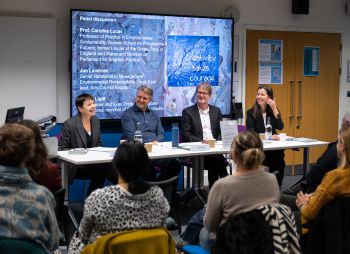Storytelling as Climate Action: Business School highlights cultural sector’s role in sustainability
By: Serena Mitchell
Last updated: Thursday, 27 November 2025

Panelists Caroline Lucas, Jon Linstrum, Angus Light and Monica Masucci
Can artists, creatives, and cultural leaders become powerful drivers of climate action? A packed event hosted by the University of Sussex Business School suggests the answer is a resounding yes.
On Wednesday 19 November, the University of Sussex Business School was buzzing with energy as scholars, practitioners, and policymakers came together for a sold-out event organised by the Business School’s Digital and Creative Economy Research Mobilisation Group.
Dr Ilaria Pappalepore and Prof. Elisa Salvador, editors of two forthcoming Routledge volumes on the subject, opened the event by sharing insights from over 20 international case studies. The speakers noted "the vital role the creative and cultural industries can play in driving the sustainable transition, both by innovating within their own practices and by inspiring audience behavioural change through the content they create."
The event featured a high-profile panel chaired by Dr Monica Masucci, Associate Professor of Strategy and Entrepreneurship. Panellists included:
- Caroline Lucas, Professor of Practice in Environmental Sustainability at Sussex and former MP for Brighton Pavilion,
- Jon Linstrum, Senior Relationship Manager at Arts Council England,
- Angus Light, Co-founder of Locate Productions and member of Creatives for Climate.
Together, they explored how the sector can go beyond reducing its carbon footprint to tackle indirect emissions, influence public discourse, and reimagine climate futures through storytelling and imagination. They also addressed the opportunities and challenges posed by emerging technologies like generative AI.
A lively Q&A followed, with audience members keen to understand how the sector could help shift both personal behaviour and broader societal norms around sustainability.
One clear message echoed throughout the event: stories matter. As captured in the recent Open Letter to COP30, promoted by the University of Birmingham, storytelling can be a powerful tool in climate mitigation and adaptation.
The conversation didn’t end there. The Research Mobilisation Group has since continued building momentum, including hosting a roundtable at the Brighton & Hove Culture Alliance’s summit on sustainability in the art and culture. These ongoing collaborations signal a growing commitment to making the creative sector not just a participant in, but a leader of, the climate transition.
The organisers would like to thank the Sussex School for Progressive Futures and BIMA (British Interactive Media Association) for their collaboration.